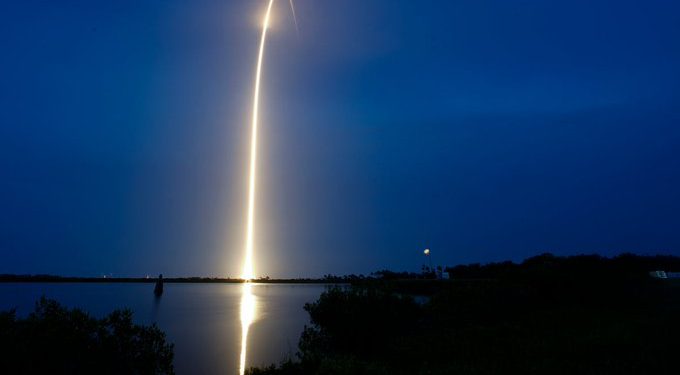Rome: Stealth submarines fitted with space-shooting lasers, supply-chain sabotage and custom-built attack satellites armed with ion thrusters. Those are just some of the strategies Chinese scientists have been developing to counter what Beijing sees as a potent threat: Elon Musk’s armada of Starlink communications satellites.
Chinese government and military scientists, concerned about Starlink’s potential use by adversaries in a military confrontation and for spying, have published dozens of papers in public journals that explore ways to hunt and destroy Musk’s satellites, an Associated Press review found.
Chinese researchers believe that Starlink, a vast constellation of low-orbit satellites that deliver cheap, fast and ubiquitous connectivity even in remote areas, poses a high risk to the Chinese government and its strategic interests.
That fear has mostly been driven by the company’s close ties to the US intelligence and defence establishment, as well as its growing global footprint.
“As the United States integrates Starlink technology into military space assets to gain a strategic advantage over its adversaries, other countries increasingly perceive Starlink as a security threat in nuclear, space, and cyber domains,” wrote professors from China’s National University of Defence Technology in a 2023 paper.
Chinese researchers are not the only ones concerned about Starlink, which has a stranglehold on certain space-based communications. Some traditional US allies are also questioning the wisdom of handing over core communications infrastructure, and a potential trove of data, to a company run by an unpredictable foreign businessman whose allegiances are not always clear.
Apprehensions deepened after Russia’s 2022 full-scale invasion of Ukraine made clear the battlefield advantages Starlink satellites could convey and have been exacerbated by Musk’s proliferating political interests.
Musk pumped tens of millions of dollars into President Donald Trump’s reelection effort and emerged, temporarily, as a key adviser and government official. As Musk toys with the idea of starting his own political party, he has also taken an increasing interest in European politics, using his influence to promote an array of hard-right and insurgent figures often at odds with establishment politicians.
Musk left the Trump administration in May, and within days, his relationship with Trump publicly imploded in a feud on social media.
SpaceX, the rocket launch and space-based communications company that Musk founded and that operates Starlink, remains inextricably linked with core US government functions.
It has won billions in contracts to provide launch services for NASA missions and military satellites, to recuperate astronauts stranded at the International Space Station and to build a network of spy satellites for the National Reconnaissance Office.
Starlink’s space dominance has sparked a global scramble to come up with viable alternatives. But its crushing first-mover advantage has given SpaceX near monopoly power, further complicating the currents of business, politics and national security that converge on Musk and his companies.
Starlink dominates space
Since its first launch in 2019, Starlink has come to account for about two-thirds of all active satellites, according to Jonathan McDowell, an astronomer at the Harvard-Smithsonian Centre for Astrophysics, who writes a newsletter tracking satellite launches.
SpaceX operates more than 8,000 active satellites and eventually aims to deploy tens of thousands more.
Beijing’s tendency to view Starlink as a tool of US military power has sharpened its efforts to develop countermeasures, which, if deployed, could increase the risk of collateral damage to other customers as SpaceX expands its global footprint.
The same satellites that pass over China also potentially serve Europe, Ukraine, the United States and other geographies as they continue their path around the earth.
Starlink says it operates in more than 140 countries, and recently made inroads in Vietnam, Niger, Somalia, the Democratic Republic of Congo and Pakistan.
In June, Starlink also obtained a license to operate in India, overcoming national security concerns and powerful domestic telecom interests to crack open a tech-savvy market of nearly 1.5 billion people.
On the company’s own map of coverage, it has very few dead zones beyond those in North Korea, Iran and China.
No other country or company is close to catching up with Starlink. Amazon billionaire Jeff Bezos has taken aim at rival Musk with Project Kuiper, which launched its first batch of internet satellites into orbit in April. So far, Amazon has just 78 satellites in orbit, with 3,232 planned, according to McDowell, and London-based Eutelstat OneWeb has around 650 satellites in orbit, a fraction of the fleet it had initially planned.
The European Union is spending billions to develop its own satellite array, called the IRIS2 initiative, but remains woefully behind. EU officials have had to lobby their own member states not to sign contracts with Starlink while it gets up and running.
“We are allies with the United States of America, but we need to have our strategic autonomy,” said Christophe Grudler, a French member of the European Parliament who led legislative work on IRIS2. “The risk is not having our destiny in our own hands.”
China has been public about its ambition to build its own version of Starlink to meet both domestic national security needs and compete with Starlink in foreign markets.
In 2021, Beijing established the state-owned China SatNet company and tasked it with launching a megaconstellation with military capabilities, known as Guowang. In December, the company launched its first operational satellites, and now has 60 of a planned 13,000 in orbit, according to McDowell.
Qianfan, a company backed by the Shanghai government, has launched 90 satellites out of some 15,000 planned. The Brazilian government in November announced a deal with Qianfan, after Musk had a scorching public fight with a Brazilian judge investigating X, who also froze SpaceX’s bank accounts in the country.
Qianfan is also targeting customers in Kazakhstan, Malaysia, Oman, Pakistan and Uzbekistan and has ambitions to expand across the African continent, according to a slide presented at a space industry conference last year and published by the China Space Monitor.
Russia’s invasion of Ukraine supercharges concerns
Concerns about Starlink’s supremacy were supercharged by Russia’s 2022 full-scale invasion of Ukraine. The war was a turning point in strategic thinking about Starlink and similar systems.
Ukraine used the Starlink network to facilitate battlefield communications and power fighter and reconnaissance drones, providing a decisive ground-game advantage.
At the same time, access to the satellites was initially controlled by a single man, Musk, who can, and did, interrupt critical services, refusing, for example, to extend coverage to support a Ukrainian counterattack in Russia-occupied Crimea.
US-led sanctions against Moscow after the full-scale invasion also curtailed the availability of Western technology in Russia, underscoring the geopolitical risks inherent in relying on foreign actors for access to critical infrastructure.
Nearly all of the 64 papers about Starlink reviewed by AP in Chinese journals were published after the conflict started.
Assessing Starlink’s capabilities and vulnerabilities
Starlink’s omnipresence and potential military applications have unnerved Beijing and spurred the nation’s scientists to action. In paper after paper, researchers painstakingly assessed the capabilities and vulnerabilities of a network that they clearly perceive as menacing and strove to understand what China might learn, and emulate, from Musk’s company as Beijing works to develop a similar satellite system.
Though Starlink does not operate in China, Musk’s satellites nonetheless can sweep over Chinese territory. Researchers from China’s National Defence University in 2023 simulated Starlink’s coverage of key geographies, including Beijing, Taiwan, and the polar regions, and determined that Starlink can achieve round-the-clock coverage of Beijing.
“The Starlink constellation coverage capacity of all regions in the world is improving steadily and in high speed,” they concluded.
In another paper, this one published by the government-backed China Industrial Control Systems Cyber Emergency Response Team, researchers mapped out vulnerabilities in Starlink’s supply chain.
“The company has more than 140 first-tier suppliers and a large number of second-tier and third-tier suppliers downstream,” they wrote in a 2023 paper. “The supervision for cybersecurity is limited.”
Engineers from the People’s Liberation Army, in another 2023 paper, suggested creating a fleet of satellites to tail Starlink satellites, collecting signals and potentially using corrosive materials to damage their batteries or ion thrusters to interfere with their solar panels.
Other Chinese academics have encouraged Beijing to use global regulations and diplomacy to contain Musk, even as the nation’s engineers have continued to elaborate active countermeasures: Deploy small optical telescopes already in commercial production to monitor Starlink arrays.
Concoct deep fakes to create fictitious targets. Shoot powerful lasers to burn Musk’s equipment.
Some US analysts say Beijing’s fears may be overblown, but such assessments appear to have done little to cool domestic debate.
AP






































